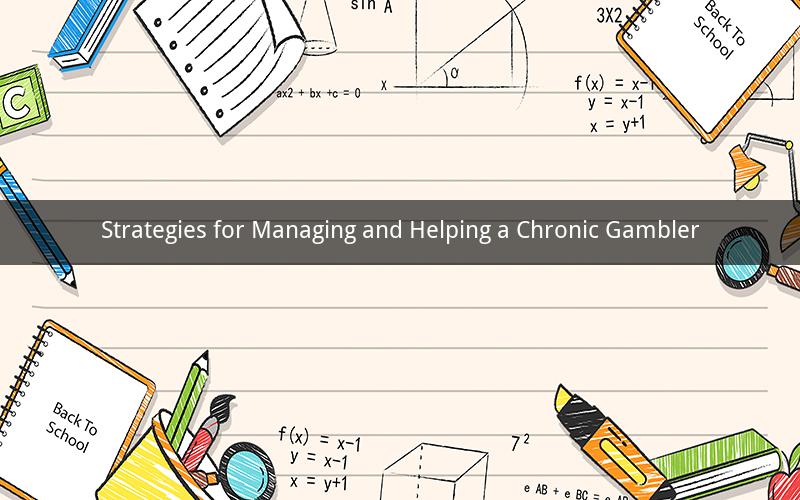
Chronic gambling, often referred to as problem gambling or gambling addiction, is a significant concern that affects many individuals and their families. It is characterized by an inability to control gambling behavior, leading to negative consequences in various aspects of life, including financial, emotional, and social well-being. Dealing with a chronic gambler can be challenging, but there are effective strategies to help manage the situation and support the individual in overcoming their addiction.
1. Understanding Chronic Gambling
Chronic gambling is a complex issue that can be influenced by various factors, such as genetic predisposition, environmental cues, and personal vulnerabilities. It is crucial to have a clear understanding of the problem to effectively address it. Some key aspects to consider include:
- The severity of the addiction: Determine whether the individual's gambling behavior is mild, moderate, or severe.
- The impact on life: Assess the extent to which gambling affects the individual's personal, professional, and financial life.
- The presence of co-occurring disorders: Identify any underlying mental health conditions that may contribute to the gambling addiction.
2. Communication Strategies
Effective communication is vital in dealing with a chronic gambler. Here are some strategies to consider:
- Open and non-judgmental dialogue: Encourage the individual to express their feelings and concerns without fear of judgment or criticism.
- Active listening: Show empathy and actively listen to their perspective, allowing them to vent and process their emotions.
- Encourage honesty: Encourage the individual to be honest about their gambling behavior and the challenges they face.
- Set boundaries: Establish clear boundaries regarding the individual's gambling habits and support system.
3. Support Systems
Creating a strong support system can significantly aid in the recovery process. Consider the following approaches:
- Family and friends: Encourage loved ones to be supportive and understanding, while also holding the individual accountable for their actions.
- Professional help: Consider seeking the assistance of a therapist, counselor, or gambling addiction specialist to provide personalized support and guidance.
- Support groups: Encourage the individual to join a support group, such as Gamblers Anonymous, where they can connect with others who share similar experiences.
4. Financial Management
Financial challenges are often a major consequence of chronic gambling. Here are some strategies to help manage the situation:
- Budgeting: Work with the individual to create a realistic budget that allocates funds for essential expenses, while limiting discretionary spending.
- Debt counseling: If the individual is in debt, consider seeking the help of a debt counselor to develop a plan for repayment.
- Asset protection: Encourage the individual to secure their assets, such as property or investments, to prevent further financial damage.
5. Treatment Options
There are various treatment options available for chronic gamblers, including:
- Cognitive-behavioral therapy (CBT): CBT helps individuals identify and change negative thought patterns that contribute to their gambling addiction.
- Motivational interviewing: This approach helps individuals recognize the need for change and develop a plan to achieve their goals.
-药物治疗: Some chronic gamblers may benefit from medication, such as selective serotonin reuptake inhibitors (SSRIs), to manage underlying mental health conditions.
5 Questions and Answers
1. Q: How can I encourage my loved one to seek help for their gambling addiction?
A: Start by expressing your concern and support without judgment. Offer to help them find a professional or support group, and let them know you are willing to be there for them throughout the process.
2. Q: What should I do if my loved one is in debt due to gambling?
A: Encourage them to seek financial counseling or debt management assistance. In the meantime, help them create a budget to manage their expenses and prioritize debt repayment.
3. Q: Can medication help with chronic gambling addiction?
A: While medication may not cure gambling addiction, it can help manage underlying mental health conditions that contribute to the addiction. Consult with a healthcare professional to determine if medication is appropriate for your loved one.
4. Q: How can I support a friend who is struggling with chronic gambling?
A: Be a reliable source of support and encouragement. Offer to listen, help them find professional help, and hold them accountable for their actions. Remember to take care of your own well-being during this process.
5. Q: Is it possible for a chronic gambler to recover from their addiction?
A: Yes, it is possible for a chronic gambler to recover from their addiction. Recovery requires commitment, time, and support from others. With the right resources and mindset, individuals can overcome their gambling addiction and lead a fulfilling life.